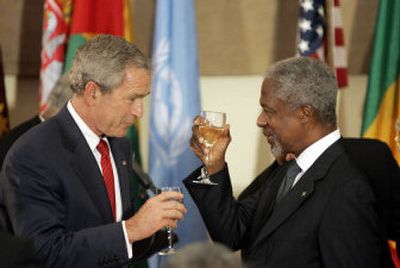Bush offers assurances to Iran at U.N.

UNITED NATIONS – President Bush sought to assure the Iranian people that he wants a diplomatic solution to the impasse over that country’s nuclear activities but warned that their leaders are obstructing progress by funding terrorism and pursuing nuclear weapons.
Striking a more conciliatory tone than in previous addresses on the subject, Bush said Tuesday that the United States has no objections to Iran achieving a “truly peaceful nuclear power program” and told the Iranians that he looks forward “to the day when you can live in freedom – and America and Iran can be good friends and close partners in the cause of peace.”
The comments on Iran were only a small part of the president’s 20-minute address to the U.N. General Assembly, which was devoted to urging the world to support the forces of moderation and reform in the greater Middle East.
Bush also urged the United Nations to act quickly to deploy a robust peacekeeping force to the war-ravaged Darfur region of Sudan, apparently over the objections of the Sudanese government. Speaking to the people of Darfur, he said, “Your lives and the credibility of the United Nations is at stake.”
But the dispute over Iran’s nuclear program assumed center stage at the opening of the annual General Assembly session.
On the sidelines of the session, Bush and U.S. diplomats continued to try to shore up support for new sanctions on Iran for its refusal to abide by a Security Council resolution insisting it halt uranium enrichment, a possible step toward building nuclear weapons.
Meanwhile, Iranian President Mahmoud Ahmadinejad addressed the General Assembly several hours after Bush, and accused the United States of rigging the United Nations to advance its own military and economic dominance and to oppress its weaker adversaries.
In his second such address to the world body, the Iranian leader charged that U.S. policies throughout the Middle East, including its support for Israel and the occupation of Iraq, have furthered human suffering in the region. He said the U.S. nuclear program poses a greater threat to international peace and security than Iran’s program does.
Ahmadinejad dismissed assertions by Bush that Iran is seeking nuclear weapons. “All our nuclear activities are transparent, peaceful and under the watchful eyes of IAEA inspectors,” he said, referring to the International Atomic Energy Agency.
There had been considerable speculation at the United Nations about the possibility of a chance meeting between Bush and Ahmadinejad, but there were no encounters.
For Bush, Tuesday’s remarks seemed a different kind of exercise than his recent speeches on terrorism and Islamic radicalism in the Middle East. While he has used previous speeches to paint an alarming portrait of Iran – he called it a “grave threat” to the world just two weeks ago in Salt Lake City – on Tuesday he emphasized painting a more benign picture of U.S. intentions. Whether the effort will succeed is uncertain, given the long history of bitter feelings in Iran over past American interference in Iranian affairs, including the overthrow of an elected president in 1954.
To the people of Iran, Bush said in his speech, “the United States respects you; we respect your country. We admire your rich history, your vibrant culture and your many contributions to civilization. You deserve an opportunity to determine your own future.”
He added, “The greatest obstacle to this future is that your rulers have chosen to deny you liberty and to use your nation’s resources to fund terrorism and fuel extremism and pursue nuclear weapons.”
Speaking generally to people across the broader Middle East, Bush sought to combat what he described as “propaganda” being spread by extremists “claiming that the West is engaged in a war against Islam. This propaganda is false and its purpose is to confuse you and justify acts of terror. We respect Islam, but we will protect our people from those who pervert Islam to sow death and destruction.”
Bush’s address drew polite applause from the hundreds of officials, though there was clearly unease with U.S. policies. In U.N. Secretary-General Kofi Annan’s address, his last before the opening of a General Assembly session, he took a swipe at the Bush administration’s counterterrorism strategy, saying that the “necessary and legitimate struggle” against terrorism has been used as a “pretext to abridge and abrogate fundamental human rights, thereby ceding more moral ground to the terrorists and helping them find recruits.”